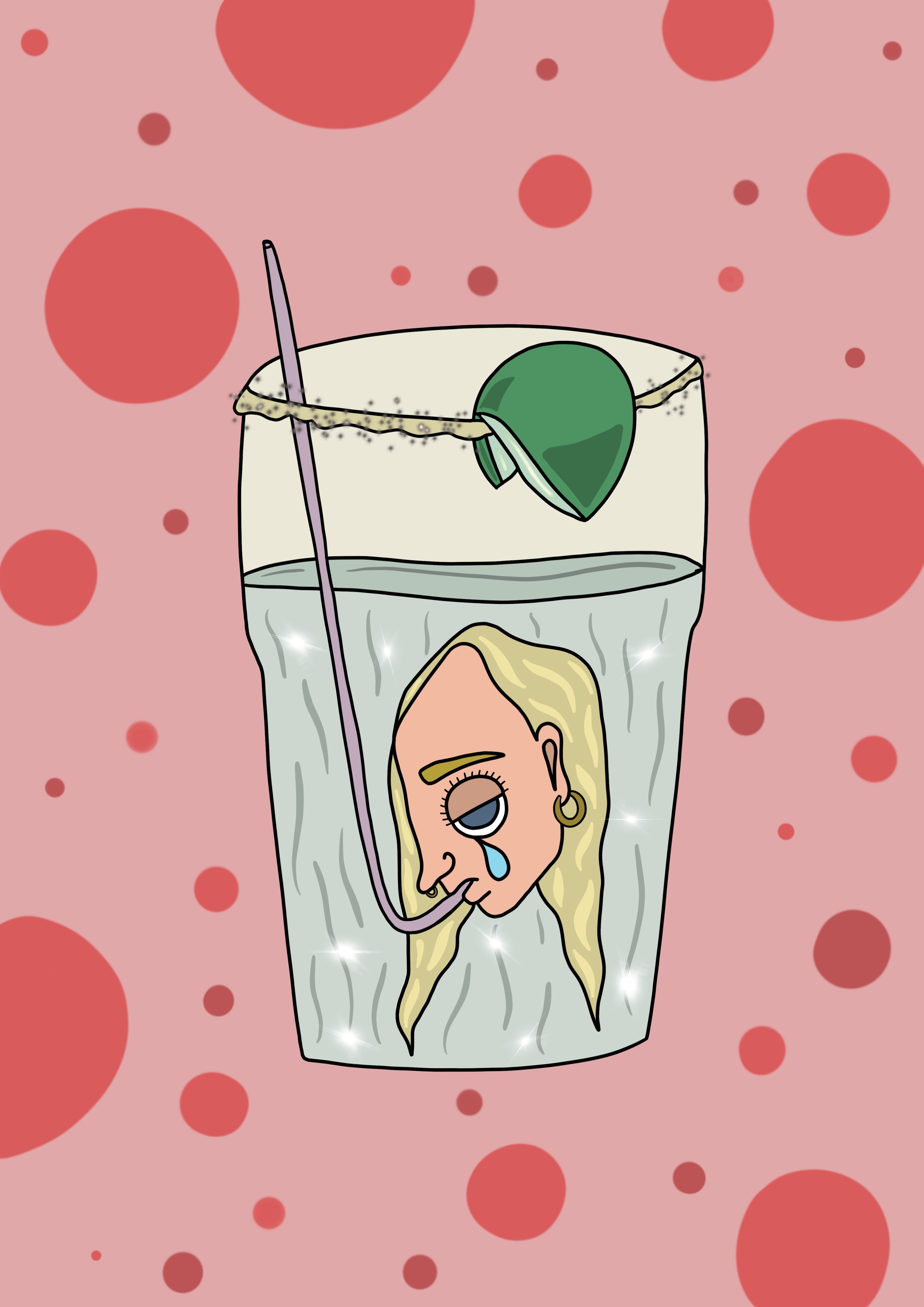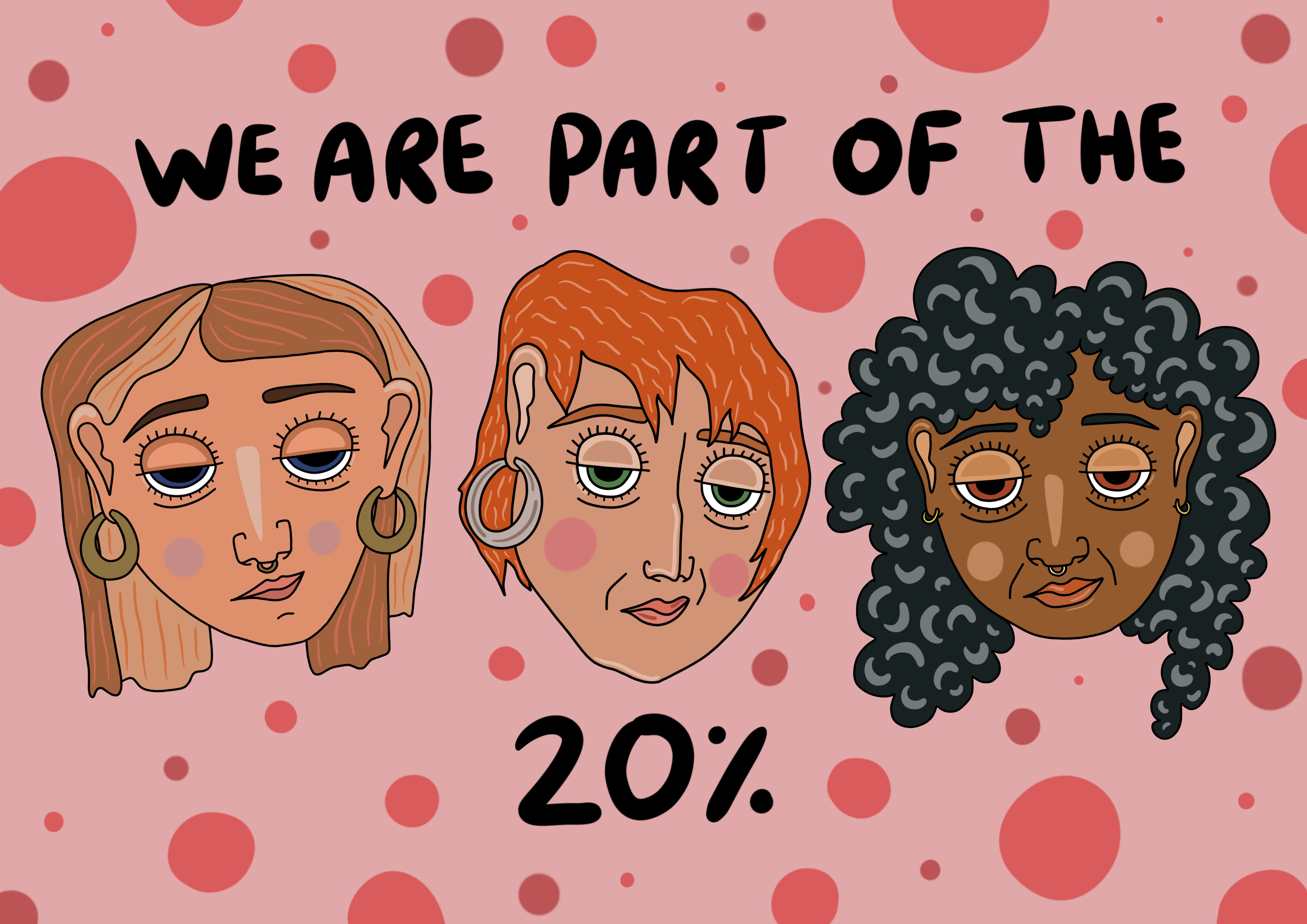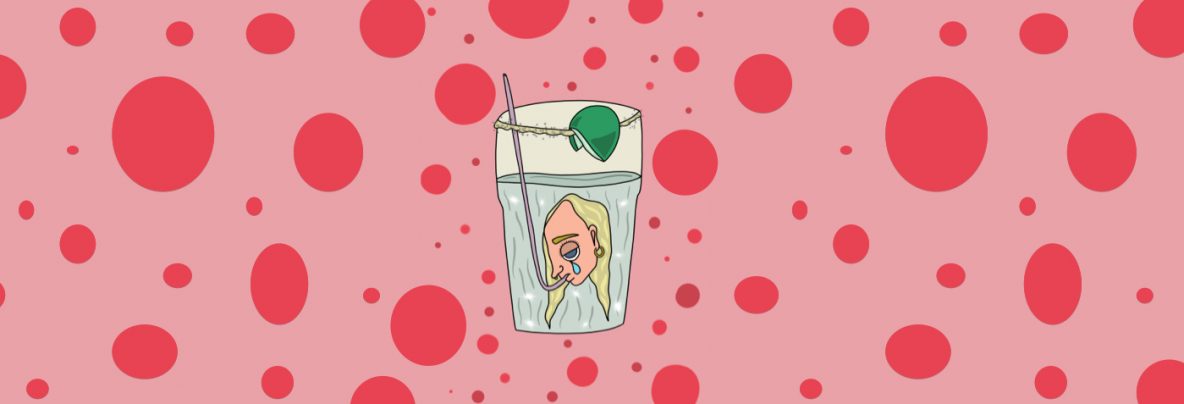VODKA SOBER LIME
Sobriety is cool too
By Lauren Drinkwater / 6 October 2019

Illustration by Lauren Drinkwater
I’ve been drunk a handful of times this year, all of which have been a bad experience for me involving waking up with a heavy head of anxiety and the standard dehydration, nausea and an empty purse. Trying to live a more sober life has ironically left me feeling tipsy, as I’m rearranging my own boundaries with alcohol.
I’ve always been a massive party girl: I had my first drink when I was 12, and smoked my first zoot at the same age. It was all pretty normal for me - downing drinks quickly before linking up with friends to go out; having a shot of tequila before doing anything that made me nervous, like going on a first date or to an event where I didn’t know anyone.
It wasn’t until I had another bad experience with booze last December which left me feeling more confused and lost than ever that I began to realise that each time I drank, my suicidal thoughts would hit me like a shot of Sambuca: potent and hard to swallow. I’ve never been one to get too emotional when I’m drinking; I’m usually quite a happy-go-lucky, up-for-a-good-time drunk. But now I was faced with a different reality. I couldn’t escape the dark thoughts and Alice in Wonderland tears from arising.
I think it’s quite a natural path for people who suffer from mental illness to use alcohol as an escape mechanism, although, unfortunately, it doesn’t bring the escape you need and rather just a heavy weight of guilt, shame, anxiety and regret. Studies show that 20% of people diagnosed with an alcohol or substance use disorder also suffer from an anxiety or mood disorder. This number scares me because I am one of those 20%. I am part of that statistic that is told through the media that drinking is fun, it brings people together and is elegant and sexy..well, according to the gin & vodka adverts I see on a regular basis.

I resumed going out but I drank only soda limes: this way, people wouldn’t really notice that I wasn’t drinking. It seems like when you actually tell people, everyone finds a reason to be offended. There have been pretty standard questions like ‘why are you not drinking?’, followed by ‘oh come on it’s only a drink’, and ‘it’s fun’. Naturally, it made me feel like I was missing out on something spectacular, but slowly over the last year I’ve realised that the majority of people are drinking to escape something; to ‘drink their troubles away’ and to forget and let themselves go.
This isn’t something I have anything against...I’m a woman who has a lot to run away from and boy have I been drowning my sorrows since before I was a teenager. I understand it, and sometimes I still do it. I haven’t completely stopped drinking because, well, I still want to be able to enjoy a drink...just without the suicidal thoughts. (Not a lot to ask for, I know!)
Britain is known for binge drinking; downing Lambrini, stealing whatever bottle of liquor our parents have (and adored) which we would then fill back up with water was a rite of passage for every British teen. You’ve only got to witness the UK on a bank holiday weekend when the sun’s out to know how much we love to open tabs in pubs and stumble home at a reasonable time because day drinking demolishes your stamina. But what does it mean for our health, our minds and our growth?
It feels like we are desensitising ourselves to our own identities, and sacrificing our social skills. I’ve spent the last year going sober to events, performing spoken word, meeting up with people and spending time in the pub with my mates.
So, what have I noticed in my new sober goggles?
- No-one ever really notices that you aren’t drinking, firstly because they’re drunk and secondly because people don’t actually care. We are (and this isn’t always a bad thing) naturally selfish, putting ourselves first and being the main character in our story.
- Drinks are way cheaper without the booze...some places give soda limes for FREE!
- You are worthy and people will accept you for the wonderful and beautiful person you are.
- A lot of other people don’t drink either.
- Yes, you can still have LOTS of fun!
- You end up with more time over the weekend.
- You can spend more money on food (that's what I’m sayinnnnng).
- Your mental health improves drastically - no second guessing your memories or conversations, more clarity regarding your sense of self, no temptation to reach for the medicine cabinet when you’re in danger of yourself and your suicidal thoughts, and an incredible overall peace of mind.
- You make genuine sober connections. I’ve made so many friends this year, and all whilst being sober. This is so reassuring, especially if you deal with social anxiety and self-doubt.
Of course there are the highs, but I would be lying if I didn’t mention the worries that also play on my mind... the good still outweighs the bad!
- You become scared to drink. I’ve become anxious about when I do go out and want to drink, in case I end up losing control or not knowing when to stop.
- You feel guilt and shame when you do drink because it feels like a step back.
- There’s a lack of understanding: why I can’t be like other people and just drink and have fun?
- People can make you feel pressured into drinking to have a good time.
- You lose friends who don’t understand.
- I’ve questioned whether I’ll ever be able to date someone, in case they think I’m boring for not always wanting to go out and get hammered.

So yes, there are some ‘negatives’, but you’ll notice that nearly all of them are in my own head and actually derive from my own insecurities.
The great thing is that these can all be worked on through the power of self-worth, self-love and, for me, my weekly therapy session. My therapist has been next-level helpful throughout my transformation and has helped me work my way through the link between mental illness and substance abuse which, ultimately, I believe binge drinking is. There is a huge difference between enjoying a glass of blush and drinking whatever is in front of me to wipe me out.
I came across another statistic that says alcohol is responsible for 30% of suicides. WOW. This one scared me even more, and not because the % but because it’s so relatable. I have had more suicidal thoughts from drinking than when I’ve been sober this year and for whatever messed up reason, these warnings aren’t issued when purchasing alcohol. Is it because we are a nation that are still frightened of actually talking truth on mental health, let alone the connection with mental illness and alcohol abuse.
Please, I ask of you if you’re reading this and you are mentally ill and drink, to please consider getting a mental health professional to assist you on your journey through life. I know that reading a number on an article may not always stand out, but, these numbers are true, these numbers are your friends or family, these numbers may also be you. Your life is so special and you are a beautiful soul. If you think talking to someone can help, reach for your phone and take the first step in gaining back some control with alcohol. I promise that the exposure to this world will only do you good in the long run.
I’m not fully converted to sobriety but the longer this path lays in front of me, the more I see myself moving towards it in the future. With that being said, I still enjoy the odd drink, but I hope that I can use the lessons I’ve learnt this year to be more respectful of my boundaries and still have a beautiful time!
Helpful links if needed:
https://www.nhs.uk/live-well/alcohol-support/
https://www.drinkaware.co.uk/alcohol-support-services/
https://www.nhs.uk/conditions/stress-anxiety-depression/mental-health-helplines/
Art by
Words by
Share this article

